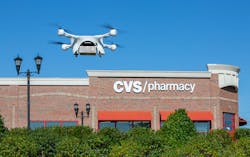UPS took another step forward in its Flight Forward drone delivery business with a successful CVS Pharmacy prescription delivery to a North Carolina customer’s home and another to a retirement community.
Both flights on Friday, Nov. 1, used the M2 drone system by UPS partner and drone systems developer Matternet. This comes weeks after UPS rival FedEx teamed up with Alphabet’s Wing drone delivery service for business-to-consumer drone deliveries in Virginia. Wing also partnered with CVS competitor Walgreens for the first consumer-delivery drone service in mid-October.
The UPS Flight Forward deliveries last week launched from a CVS store in Cary, N.C., and flew to customers’ homes. The drones flew autonomously while monitored by a remote operator who could intervene if needed. The drone hovered 20 feet over the properties as it slowly lowered the packages by cable and winch to the ground. One bag was delivered to a CVS customer with limited mobility that makes it difficult to travel to the pharmacy to pick up a prescription.
UPS and CVS are working together to develop new drone delivery uses, including this business-to-consumer operating model. The companies plan to fine-tune the delivery program in the coming months in hopes of marketing the speed and convenience advantages of UAVs. The Nov. 1 prescription delivery flights occurred with FAA approval to conduct a residential drone delivery and according to FAA regulations.
“CVS is exploring many types of delivery options for urban, suburban and rural markets,” said Kevin Hourican, president of CVS Pharmacy. “We see big potential in drone delivery in rural communities where life-saving medications are needed and consumers at times cannot conveniently access one of our stores.”
UPS launched its drone airline, Flight Forward, earlier this fall after a successful pilot program of transporting medical specimen at a North Carolina hospital. That pilot program began in March using similar Matternet drones. UPS says it has flown more than 1,500 revenue-generating drone deliveries — carrying nearly 8,000 medical samples — at WakeMed Hospital in Raleigh, N.C.
UPS is expanding the drone delivery services to other hospitals, universities and corporate campuses around the U.S. while also turning its attention to consumer deliveries. Other companies, including Amazon.com’s Prime Air, also are developing drone-delivery platforms.
But this is the first time UPS Flight Forward has flown beyond the fixed route of operations it currently offers on hospital campuses. It was the first company approved by the FAA to operate a drone airline. UPS earned this certification — the broadest available from the FAA — in September. It allows the company to charge for drone deliveries and to fly as many drones as necessary to meet customer demand.
“We now have an opportunity to offer different drone delivery solutions, tailored to meet customer needs for speed and convenience,” said Scott Price, UPS chief strategy and transformation officer. “Delivering prescriptions by drone directly to homes could greatly improve the patient experience for CVS customers. We’re delighted to build new services that will shatter preconceived notions of how, when and where goods can be delivered.”
UPS FF is building out its ground infrastructure in hopes of expanding it to several industries in the future. And while the nascent delivery service has focused on the health care industry, it has its sights set on transporting special commodities and other regulated goods in the future as it partners with other drone manufacturers to build varying cargo capacities.
About the Author
Josh Fisher
Editor-in-Chief
Editor-in-Chief Josh Fisher has been with FleetOwner since 2017. He covers everything from modern fleet management to operational efficiency, artificial intelligence, autonomous trucking, alternative fuels and powertrains, regulations, and emerging transportation technology. Based in Maryland, he writes the Lane Shift Ahead column about the changing North American transportation landscape.

